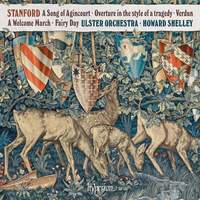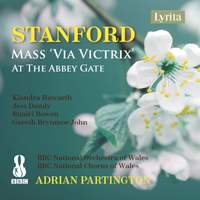Recording of the Week,
Stanford Ceremonial Works from Howard Shelley and the Ulster Orchestra
I must admit that until last week my knowledge of Charles Villiers Stanford was largely limited to his choral church music and sea-songs, but a new album of his rarely-recorded ceremonial orchestral works from Howard Shelley and the Ulster Orchestra offers a fantastic opportunity to see the Irish composer painting on a much larger canvas and giving Elgar and Walton a run for their money in the process. It represents quite a change of pace for the British pianist-conductor and this orchestra after their recent advocacy for Dussek on the label’s venerable Classical Piano Concertos series, and they rise to the occasion quite splendidly: these musicians have this music in their blood, having recorded the complete symphonies under Vernon Handley for Chandos in the late 1980s and early 90s.
 The programme kicks off with the darkly dramatic Overture in the Style of a Tragedy, composed in 1903 but apparently unperformed in the composer’s lifetime and premiered by this orchestra back in 2010; the brooding, turbulent opening has more than a whiff of Wagner’s Flying Dutchman and clearly shows the influence of Stanford’s extensive studies in Germany, though the second, more lyrical theme (liberally lubricated by plenty of swooning portamenti from the strings) has an almost cinematic quality that paves the way for Korngold’s film-scores. The other two substantial works, though, have a distinctly French accent: the ‘Solemn March and Epilogue’ Verdun (reworked from Stanford’s Second Organ Sonata but entirely convincing as orchestral music on its own terms) quotes extensively from the Marseillaise and much of the brass chorale writing could easily pass for Gounod, whilst the Song of Agincourt (composed in 1918 in memory of the members of the Royal College of Music who died in the Great War) has a wonderfully troubadour-ish feel to it thanks to Stanford’s use of modal harmonies, and blossoms into a stirring contrapuntal march which testifies to the composer’s strikingly imaginative gifts as an orchestrator.
The programme kicks off with the darkly dramatic Overture in the Style of a Tragedy, composed in 1903 but apparently unperformed in the composer’s lifetime and premiered by this orchestra back in 2010; the brooding, turbulent opening has more than a whiff of Wagner’s Flying Dutchman and clearly shows the influence of Stanford’s extensive studies in Germany, though the second, more lyrical theme (liberally lubricated by plenty of swooning portamenti from the strings) has an almost cinematic quality that paves the way for Korngold’s film-scores. The other two substantial works, though, have a distinctly French accent: the ‘Solemn March and Epilogue’ Verdun (reworked from Stanford’s Second Organ Sonata but entirely convincing as orchestral music on its own terms) quotes extensively from the Marseillaise and much of the brass chorale writing could easily pass for Gounod, whilst the Song of Agincourt (composed in 1918 in memory of the members of the Royal College of Music who died in the Great War) has a wonderfully troubadour-ish feel to it thanks to Stanford’s use of modal harmonies, and blossoms into a stirring contrapuntal march which testifies to the composer’s strikingly imaginative gifts as an orchestrator.
Amid all of this pomp and circumstance, the ethereal Fairy Day for small orchestra and upper voices is a delightful palate-cleanser: setting texts by Ulster-born poet and diarist William Allingham, who counted Dante Gabriel Rossetti, Thomas Carlyle and Alfred Tennyson among his social circle, the piece was originally conceived for voices and piano received its first broadcast in this orchestral version from Shelley and the Ulster musicians just eight years ago. Shot through with whispers of Mendelssohn’s A Midsummer Night’s Dream and early stretches of Sullivan’s Iolanthe, it’s a charming sequence of three vignettes depicting 24 hours in fairy-land which should win many friends from choral societies looking to give their tenors and basses a breather, and the Derry girls of the Codetta chamber choir bring a delicious lightness and clarity to the piece; though the soprano soloist’s diction could be sharper at the very opening, the choir as a whole offer some vivid collective word-painting, and there’s wonderful work from the principal horn and woodwind soloists in the final nocturne.
The Ulster brass and percussion are on splendid form throughout, with fantastically incisive playing from the trumpets and horns in the contrapuntal sections of Agincourt in particular, though there are moments when the string sound would benefit from slightly closer mic-ing (or perhaps an extra desk or two of players - the booklet lists just ten first violins and eight seconds). Everyone concerned clearly loves and believes in this music, and after just one listening so did I – here’s hoping that more of Stanford’s large-scale works (including the operas) receive this kind of advocacy in near future, and in the meantime I’ll be checking out the first recording of his Via Victrix Mass, which was given its world premiere recording on Lyrita earlier this year.
Ulster Orchestra, Codetta, Howard Shelley
Available Formats: CD, MP3, FLAC, Hi-Res FLAC
Kiandra Howarth (soprano), Jess Dandy (contralto), Ruairi Bowen (tenor), Gareth Brynmor John (baritone)
BBC National Chorus & Orchestra of Wales, Adrian Partington
Available Formats: CD, MP3, FLAC




